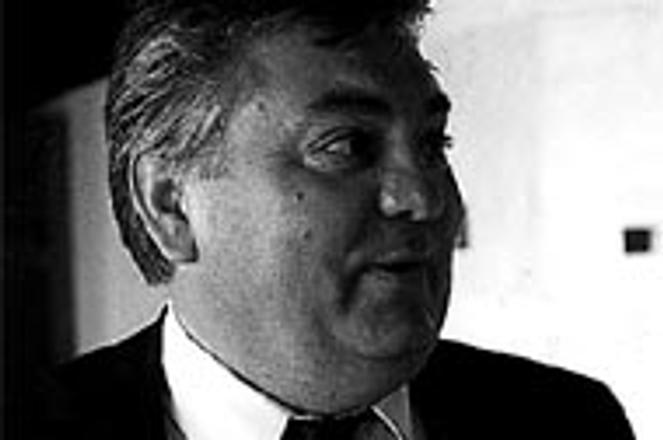"Our company is negotiating with Gazprom on creating a joint-venture to build and manage gas pipelines carrying Russian gas to Western consumers through Slovakia,"
Ľubomír Rabay, SPP spokesman
Past Economic Minister Ján Ducký is SPP's new director.Daniel Borský
Ján Ducký, the former minister of the economy who sits in parliament as a member of Prime Minister Vladimír Mečiar's political party, confirmed on April 1 that he was appointed head of Slovenský Plynárenský Priemysel (SPP), a monopoly state-run gas company. Wasting no time in his new position, Ducký announced three days later that SPP was strengthening ties with the Russian gas company Gazprom on gas transit that could lead to even wider cooperation.
SPP belongs to the most glittering family jewels of Slovakia's economy, with its 1996 after-tax profit expected to be 8.862 billion Sk, on revenues totalling around 48 billion Sk. In 1995, the company recorded 13.322 billion Sk ($404 million) in pretax profits.
For several months, the Slovak and Russian governments have been discussing the creation of a joint venture for gas transit between SPP and Gazprom, the Russian monopoly state-run gas company, a venture that Ducký seems to favor.
"The interest of the Russian side is understandable, because SPP's profits stem mainly from transit services," Ducký said in an interview for Radio Twist. "The Ministry of Economy already has a draft of what such a venture should look like."
That speculation seems to have proven true. On April 4, Ducký said at a press conference that the possible SPP-Gazprom joint-venture would focus on extra deliveries of Russian gas to current clients, adding that he will fly to Moscow the next week to negotiate the plan for the proposed 50-50 joint venture, Reuters reported.
"Operation of this joint venture would not in any case influence current delivery contracts," Ducký said. "We propose 40 percent of the overall profits, of which 50 percent would belong to SPP, be in form of compensation deals to allow Slovak goods to enter the Russian market."
Ducký said he did not expect "big" profits from the venture since placing extra-gas deliveries to current clients has been problematic. "So far we don't know how big these volumes will be," he said.
Finalizing the SPP-Gazprom deal
Signing a contract that finalizes the SPP-Gazprom partnership is believed to be one of the main reasons for Russian Prime Minister Viktor Chernomyrdin's April 24-25 visit to Slovakia. If that's true, then the groundwork already has been laid, as a SPP official told Reuters that the partnership was imminent.
"Our company is negotiating with Gazprom on creating a joint-venture to build and manage gas pipelines carrying Russian gas to Western consumers through Slovakia," SPP spokesman Ľubomír Rabay said. "It should be something similar to what exists in Hungary, but in our case the Slovak side should have a majority stake."
Gazprom has a 50 percent stake in a joint-venture called Panrusgas with the Hungarian oil and gas processing firm MOL holding the other 50 half.
Rabay said the planned joint-venture would not influence the current transfer of Russian gas through already existing pipelines. "It will manage new pipelines, but this will first require new contracts between Gazprom and its Western clients, which, as far as I know, have yet to be signed," Rabay said. He declined to disclose any further details of the planned deal, saying both partners have agreed to provide only limited information.
Demko: no comment
Ducký rejected allegations that he replaced former SPP director Arpád Demko because Demko was opposed to the plan. "On the contrary, I heard that relations with Russia have improved recently,'' he said. Demko refused to comment on his dismissal.
Opposition economists criticized the Slovak-Russian gas plan, saying that it would enable Gazprom to share the profits and the Russian government to take a hefty wedge of the Slovak monopoly's cake. şş[The joint venture would be] a signal that [Slovakia] has subdued to great political, perhaps also financial pressure,'' said Mikuláš Dzurinda, a deputy for the Christian Democratic Movement. But Ducký doesn't believe that the plan would threaten Slovakia in any way. şşI don't think that we would be pressured to accept an agreement that is not favorable for Slovakia,'' he said.
Most of SPP revenues from Russian gas
Most of SPP's revenues come from transit fees on Russian gas to western Europe, which last year totalled around 80 billion cubic meters. The pipeline, which began operation in April 1971, serves about 10 major consumers in central and western Europe. Gazprom pays for the transfer by supplying about four billion cubic meters of gas to Slovak consumers, which covers about two-thirds of domestic annual consumption.


